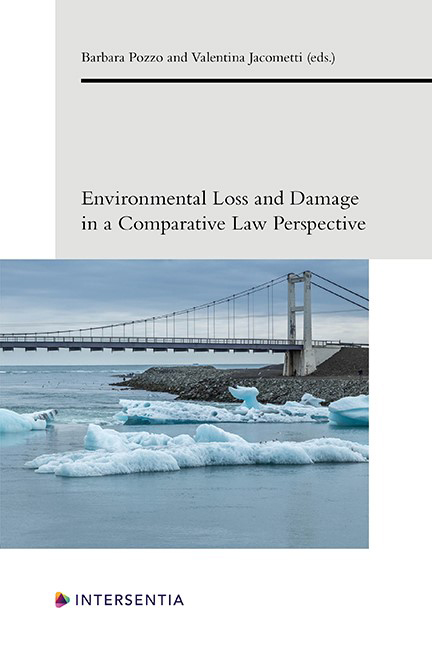Book contents
- Frontmatter
- Preface
- Contents
- List of Authors
- PART I LIABILITY FOR ENVIRONMENTAL HARM IN THE EU
- PART II PRIVATE AND CORPORATE ENVIRONMENTAL LIABILITY
- PART III THE ROLE OF CRIMINAL LIABILITY
- PART IV LEGAL TRANSPLANTS IN THE ENVIRONMENTAL FIELD: THE CASE OF ENVIRONMENTAL LIABILITY
- PART V STATE AND INTERNATIONAL ENVIRONMENTAL LIABILITY
- PART VI CLIMATE CHANGE LIABILITY
- PART VII LIABILITY, CLIMATE CHANGE AND NATURAL HAZARDS: THE ROLE OF INSURANCE
- PART VIII REAL COMPENSATION AND OFFSET REGIMES: THE STRATEGY OF “NO NET LOSS”
- About the Editors
Confiscation of Assets and Proceeds of Crime in Environmental Criminal Law: New Approaches by the German Legislator
Published online by Cambridge University Press: 26 May 2021
- Frontmatter
- Preface
- Contents
- List of Authors
- PART I LIABILITY FOR ENVIRONMENTAL HARM IN THE EU
- PART II PRIVATE AND CORPORATE ENVIRONMENTAL LIABILITY
- PART III THE ROLE OF CRIMINAL LIABILITY
- PART IV LEGAL TRANSPLANTS IN THE ENVIRONMENTAL FIELD: THE CASE OF ENVIRONMENTAL LIABILITY
- PART V STATE AND INTERNATIONAL ENVIRONMENTAL LIABILITY
- PART VI CLIMATE CHANGE LIABILITY
- PART VII LIABILITY, CLIMATE CHANGE AND NATURAL HAZARDS: THE ROLE OF INSURANCE
- PART VIII REAL COMPENSATION AND OFFSET REGIMES: THE STRATEGY OF “NO NET LOSS”
- About the Editors
Summary
INTRODUCTION
The reform of the law on the confiscation of assets of crime in Germany (Sections 73 et seq. Criminal Code) came into force on 1 July 2017.
In the past, the confiscation of assets gained by criminal acts had been rarely applied by German criminal courts since the provisions were regarded as to be too complicated.
Even in cases of environmental criminal law, forfeiture and confiscation of criminal assets did not play a significant role in the past. Yet the courts’ actions are of major importance for an effective enforcement regime of environmental offences.
A general account of the year 2016 discloses about 16,000 investigation proceedings in Germany in the area of environmental criminal law. About 1,000 of them led to a conviction. Around 97 per cent of the convictions consisted in fines, and – correspondingly – only 3 per cent in convictions to a prison sentence. The great majority of cases, namely more than 75 per cent, concerned Section 326 of the German Criminal Code, that is the illegal handling and disposal of waste. Compared over the last decade, those numbers do not change significantly.
The main aim of the German legislator was therefore to simplify the existing provisions of asset recovery and to remove any inconsistencies and practical shortcomings in order to remedy the former reluctant approach of the criminal courts thereto.
Another reason for the rare application of the provisions on forfeiture in the German Criminal Code was undoubtedly the fact that German criminal law does not so far recognise criminal liability of companies.
On the other hand, the German system of penalties in regulatory offence law (Ordnungswidrigkeitenrecht) provides not only for the imposition of fines against companies, but also for the confiscation of proceeds of regulatory offences.
TYPE AND CHARACTER OF SANCTIONS FOR ENVIRONMENTAL CRIMES
WHICH CRIMINAL LAW SANCTIONS DOES DIRECTIVE 2008/99/EC GENERALLY REQUIRE?
The first issue to be determined is which sanctions in law Directive 2008/99/EC generally requires, and particularly whether Directive 2008/99/EC requires the Member States to implement an effective system of confiscation of assets and proceeds of crime.
- Type
- Chapter
- Information
- Environmental Loss and Damage in a Comparative Law Perspective , pp. 209 - 228Publisher: IntersentiaPrint publication year: 2021
- 1
- Cited by



